An interview with musician/composer Robert Holmes
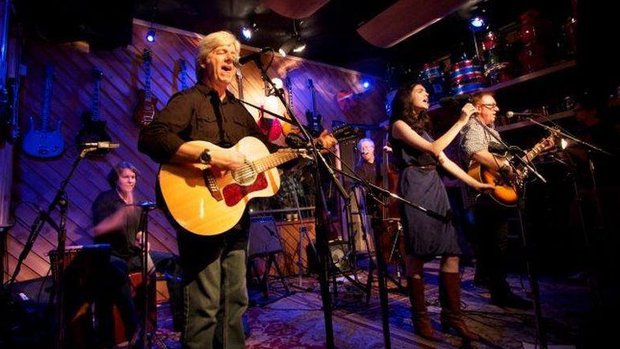
- 1 Comment
For such an accomplished musician, Robert Holmes rarely toots his own horn. But what an impressive (and interesting) career he's had! Most adventure gamers will know him as the acclaimed composer for Sierra's Gabriel Knight games, but that represents just a small part of a decades-long musical odyssey that includes numerous recordings and countless live performances spanning a wide variety of genres. Robert has turned to Kickstarter to fund his latest project, SON of SEQUEL, a second collection of original themes that he and his equally renowned wife Jane Jensen hope will help lay the groundwork for a whole new game in the future – perhaps one day even a new Gabriel Knight! I recently chatted with Robert, not only about the new album, but about a lifetime of fascinating experiences most of us could only dream of, alongside a who's who of famous artists like ... well, that would be telling. I'll let Robert share his own stories.
Hi, Robert. Welcome back to the Adventure Game Hotspot. It was great to have you as a guest on our podcast recently, but if only we knew then what we know now! Since that time you’ve shared some big news that we had to get you back here to talk about. Please tell us all about your new baby, so to speak: SON of SEQUEL.
SON of SEQUEL will continue the trip into the musical realms of Gabriel Knight- style music as well as genres from Gray Matter, like the music of The Scarlet Furies. This all-new collection will forge new ground while again bringing forward the melodic bent I am known for. There will be new themes of power, darkness, hope, expansion, and melancholy, produced and orchestrated in a unique mix of traditional and synthesized instruments and textures.
We’ll talk more about the new album shortly, but first let’s take a stroll down memory lane to get to know the man behind the music a little better. When did you first fall in love with music?
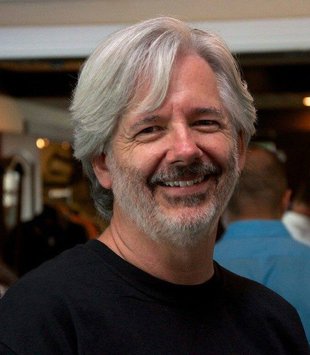
I was raised in a family where music was very constant. I had two much older siblings who were big music lovers and exposed me to all the late 50s early 60s popular music, handing down albums and singles. Our home also had an old 1922 Player piano with about 300 vintage rolls of all the standards from the 1920s on, so I was constantly playing those and watching the keyboard play itself while these great old tunes played. I was also exposed to a lot of great spiritual music in the very liberal church I grew up in. Classic hymns and all kinds of newer spiritual stuff as well. Those definitely influenced my ear for emotional music. When I was about age 7, the Beatles broke open and I was hooked to the rock and roll dream, getting my first guitar at age 9, and my first neighborhood band at age 10.
What instrument(s) did you gravitate to when you began to play personally? Did you take lessons growing up?
My first instrument was the accordion. I had a teacher who would only teach me Surf tunes like “Wipeout” and others, which somehow just didn’t sound right. 😊 I then moved to the violin, which I was terrible at, so I quickly switched to guitar. I studied for many years under some great teachers who really gave me a great love for the instrument that remains today. If I’m sitting watching a movie or something, you can bet there’s a guitar in my hands.
And when did you ultimately decide that music was something you wanted to pursue professionally?
I started writing songs as a kind of singer/songwriter when I was about 12. I won some larger regional talent shows and from there gained an agent who booked me on a tour of USO shows at Army bases, opening for the very popular blonde twin stars from TV, the “Doublemint Twins” (they had very popular commercials for Doublemint Gum). It was a great early primer on touring, playing for what felt like large crowds of a few thousand, and dealing with trying to entertain servicemen who just really wanted to see the girls in the show. 😊 After that I was hooked! I would play anywhere I could and started forming small bands with neighborhood pals. We played local malls, civic functions, festivals, junior high and high school dances and anywhere else that would have us. I think my first paid gig, there were two of us – me and a drummer (who later was the drummer for The Scarlet Furies many years later). We played a local Men's Association event. We knew like 6 songs, most of them by Creedence Clearwater Revival, and we would do each tune as like a 20 minute jam. We were paid $35 and we thought we had hit the big time. 😊
I was surprised to learn that you actually got your start in music as a rock and roller back in the seventies and early eighties. What a time to be a budding musician in Los Angeles back then!
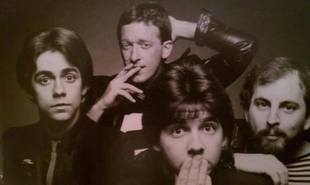
As I moved into high school, I started playing in the more popular local bands, often with guys who were much older, so I got exposed to all kinds of experiences. We would play school dances, assemblies, huge private outdoor parties (some of these with another local band called Van Halen), and we basically spent our weekends traveling around California playing all kinds of events and clubs. The first band was a kind of Crosby, Stills, Nash & Young cover band named Implied Consent (three of my pals from that became part of The Scarlet Furies 20 years later!), then there was a big 10-piece horn band called Flyte that did a lot of Tower of Power and Chicago-type stuff. Then I got into a very big production band called Eulogy, that did tons of Bowie and Genesis, and YES and Mott the Hoople. A very glam kind of band with lots of staging. We had a couple of semi-trucks full of gear and lots of satin clothes and platform shoes! The other guitar player in that band was a young prodigy named Rusty Anderson. He went on to become a huge session guy playing with everyone from Elton to being McCartney’s lead guitarist now for over 15 years! Years later he was the producer of the first Scarlet Furies album, Dark Clad Company which we recorded in his studio.
Following that I formed my own band called The Yanks. This was late 1970s and it was very power pop focused. Kind of Rockpile meets the early Beatles. Lots of hummable tunes and electric 12-string Rickenbackers. We played everywhere in Hollywood as a part of the scene for several years: The Whiskey, The Starwood, The Roxy, The Palomino, Madame Wong's, The Troubadour, all the popular clubs. We would save our money and go into studios to record demos, hoping to get a record deal. Eventually we were signed to Sound City’s production company, which was riding high after having just done the Buckingham Nicks stuff, moving into early Fleetwood Mac, and when we got there Rick Springfield was the big deal and very hot. We lived in the studio owner’s home up in the Hollywood Hills on Mulholland Drive whenever Rick wasn’t living there and was out on tour. Those were very fun days! We would spend the nights writing, then go into the studio during the day and record demos or help anyone else who needed a demo done. I got to play with some amazing folks during all that.
Anyone we’d know?
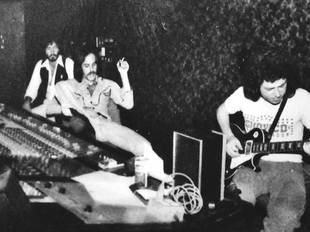
Some great players. Both on my stuff and on their stuff. People from Santana, REO Speedwagon, Toto, Rick Springfield, Fleetwood Mac, The Babys, Tom Petty’s Heartbreakers, and others. Whoever was around the studio that day would play on each other’s stuff. There’ a really fun version of the Tommy James classic I Think We’re Alone Now featuring me backed by most of those folks. Very fun!!
It’s a thrill watching the new series Daisy Jones & The Six because all the studio scenes were shot at Sound City in those very legendary studios. I keep saying, “I sang there! I sat there! I took herbal nutrition there!” 😊
What prompted your move from music into film postproduction?
I had studied Film Scoring and Cinema History at UCLA, and as it became clear a big record deal was not coming soon, I needed a day gig to pay for my apartment in Laurel Canyon and my fetish for vintage guitars. 😊 A pal got me a gig as an engineer for ADR (Automated Dialogue Replacement) post sessions at some of the studios on the Sunset Strip. So I was doing both day and night sessions with groups of the very best voice-over actors for many dubbed versions of major films and TV series like the film King Kong, and the series Dallas. There were a couple of years where we did the original Power Rangers series. That was a lot of fun! On cold nights all the high-priced working girls from the Strip would come in and hang out in the lobby to get warm. Interesting times… So that paid the bills for a few years and was actually great prep for working in games later.
And somewhere along the way, you met a lovely young lady named Jane Jensen and you both ended up at Sierra.
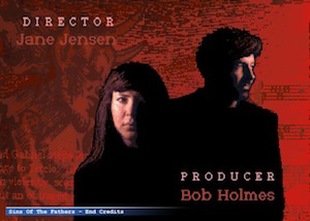
Actually, I ended up at Sierra when my then-wife was hired as a Creative Director by them. There I was stuck in a little mountain town with not much else to do, and my wife and I had split up, but I wanted to stay close to my daughter so I called up Mark Seibert and asked if he could use anyone with a music/production/composing background. Luckily my timing was good, and Mark gave me a slot in the music department. I had been there a couple of years when I moved to being a producer, and I was assigned to be the producer for a project where Jane was the designer. We hit it off as friends, and though that project was canceled, by the time Gabriel Knight was being pitched as her next project we were a couple, and I was slotted as both the producer and composer for GK1. The rest, so they say…
Were you a gamer yourself when you joined Sierra?
I was not. I had no idea what a game was, so I had a lot to learn very quickly. But we were all creating the road while we drove it, so to speak, so I was able to pick up enough to do my jobs. But I was never a gamer; still really am not. I always viewed them as similar to film projects as both the producer and the composer. I learned a lot during my first producer assignment, which was Hoyle Classic Cards. We were a small team and we all did several jobs, which was a great way to learn.
You’re surely best known among adventure gamers for your brilliant compositions for the Gabriel Knight series. You even composed an opera scene! That seems like quite the change from your early days of rock and roll.
Yeah, I remember Jane casually asking me if I would write an opera. I about choked on my Thai food! But we took a trip to Germany, Vienna, and Bavaria to really soak up all the history and saw as many operas as we could in those amazing historic opera houses, so it was a great crash course. I remember going to Wagner’s grave and apologizing for what I was about to do. But it worked out in the end. Like the rest of the GK music, I wanted to give the opera a kind of subconscious melodic underpinning that would make it memorable and almost as hummable as any other GK tune. I think that helped it be more tolerable, even though it really doesn’t sound all that much like Wagner, though it does have a ton of trombones! J The real challenge was a pop songwriter trying to work with very literal, trained opera singers from the Seattle Opera Company. Thankfully, my fellow composer and arranger Jay Usher from the Sierra music department flew in and helped me both arrange it and communicate it to the singers in the recording process. It made a huge difference! Jay and I stayed up all night the night before the sessions, pre-recording the tracks and getting it all ready. It was fun, but murder!
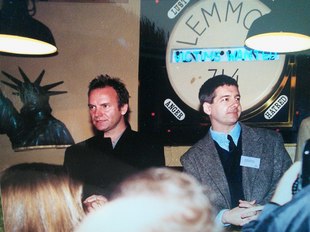
Just after GK2 started production, I had left Sierra to move to Seattle and work for Paul Allen of Microsoft to produce a great project with the musical artist Sting (which I could not say no to). So I was traveling the world following Sting around, making new content with him, or interviewing his influences, and I didn’t have time to do any music until the very end of the game development. I only had two weeks of vacation from the Sting project, so I holed up in my attic in Seattle and wrote and recorded the score and the opera for the game in those two weeks. It was nuts.
I bet! Is it challenging to score a game where you don’t have complete control over the action as you would a movie?
Back then it was challenging because we couldn’t yet do the kind of layered and responsive composing that you can do in game engines now. So whatever I wrote had to be tolerable and hopefully good enough to be heard over and over, yet get better and thankfully in some cases beloved, rather than annoying people. I think the only place I really failed at this was in the police station of GK1, where I inserted a whistle into the tune as a rhythmic vehicle. That got old fast, I’m afraid. 😊
Asking an artist to describe their creative process is an impossible task, but as a composer, how do you decide what instruments will work best for certain scores?
I’m a big believer in the few and the critical for creative projects. This means when I start anything, especially musical, I purposely create a set of rules, or “legs on the table” that put me in a box as the creator. This means I usually pick four or five elements or textures, or instruments that will make up the musical language for that project. Then anything I write and produce has to be at least nested in those elements. This helps create continuity, and limits possibilities so you can actually get something done.
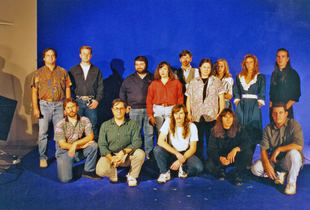
Any favourite memories from your time at Sierra?
Too many to grab just one. It was a very special group of people; very warm, very funny, hard working but loving what we were doing. We played as hard as we worked, and most of the people there were multi-talented and very smart people, yet some of the sweetest and most memorable in the course of my 30-year career. Some of my favorite memories are from the annual Christmas parties we would hold at a big lodge up in Yosemite. So many talented folks! Crazy and brilliant times!
You composed the scores for Jane’s adventures at Pinkerton Road as well, including Gray Matter and Moebius: Empire Rising. I’d imagine that working so closely with one’s spouse has its own special rewards and challenges.
Gray Matter was before Pinkerton Road, so it worked more like a GK production cycle. But the Pinkerton Road games were cool because we did it all together. Jane and I are partners in the studio, and we worked on all the elements of the business and the games together. Those were a crazy couple of years, though, because we were working on three games at the same time, with not nearly enough budget. For instance, it was not uncommon for a GK game to have a budget of 2-3 million. We created the Sins of the Fathers Anniversary Edition, Moebius: Empire Rising, and Lola and Lucy’s Big Adventure all on the budget of about $450k from the Kickstarter. Due to this we had to make a lot of compromises that we took a lot of heat for, and we ended up putting a lot of our own money into the games to finish them. But we delivered what we said we would, in the timeframe we had promised them. Which is more that I can say about many Kickstarters. In general though, Jane and I work very well together. We trust each other’s opinions and know each other’s strengths. When it comes to music, Jane has always been very open to my approach and has let me make the musical decisions. I try to let her do the writing as well. 😊
Since then you’ve been able to return to the stage with The Scarlet Furies, alongside some familiar musical companions and a very special lead singer, the multi-talented Raleigh Holmes. It must be a father’s dream to perform live with friends alongside his own daughter.
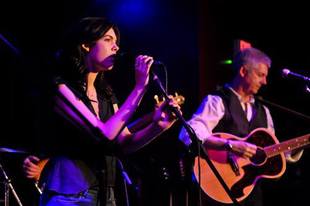
The Furies were a total joy to do. Not only because of being able to do it with Raleigh, but the rest of the band were guys I grew up playing with as kids, so we all spoke the same musical language and had the same influences. We originally got together to do one show to back up Raleigh at a showcase in Los Angeles. That ended up as thousands of shows over six years and two albums. We spent a whole year just woodshedding before we ever played out as The Scarlet Furies, so by the time we were touring we were very well-rehearsed. It’s been great to see how the gaming community accepted and has come to love the music of the band through the tunes they were featured on in Gray Matter! I’m very proud of those shows and albums. We were one of the very first “Americana” bands, long before it became popular, so it’s cool to know we were a part of that.
The band did some recording for Phoenix Online’s Cognition series (“The Taking” is my personal fave), in between touring and making your two albums. How long did you play together?
Actually, “The Taking” was not the band – it was just Raleigh and I. I did all the playing and Raleigh put the vocal on. We did the same thing for the opening song for Moebius, “The Wheel.” Raleigh was also the voice of Erica Reed for the game, which is fun to hear. She’s a great actress and did some great films and TV over the years as well as her music. My favorites are her token horror movie Crawlspace, and Kill Me, Deadly. Both are a fun watch!
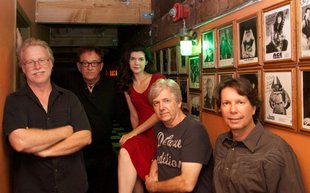
The Furies played and toured for six years, touring all over the West. We opened and played with many of our heroes, including Peter Asher, Jim Messina, Leon Russell, The Strawbs, The Zombies, The Subdudes, and more. We had some great experiences!
We actually did three albums if you count the Gray Matter soundtrack. The others are Dark Clad Company and Bury Me In Symmetry, the live album. I’m very proud of both albums, and so thankful we had the opportunity to do them together.
Your work with the Furies added some new layers (or at least, “new” to those only familiar with your game themes) to your rather eclectic musical repertoire. Do you prefer certain styles of music over others?
I love all kinds of music. Most passionately, anything from the 1950s through the 60s and 70s. I’m a big lover of all kinds of rock, folk, and pop, and especially prog rock like YES or Genesis, etc. I also love great film scores from the golden age of Hollywood and classic Broadway such as Rodgers and Hammerstein. Also, classic old-school Christmas music gets me every time. My favorite album of all time is Close to the Edge by YES. I want to hear it when I’m on my way off the planet. 😊
Who are some of your other favourite personal songwriters/composers?
Harry Nilsson, Elton John, George Harrison, Dimitri Tiomkin, Max Steiner, John Barry, Tony Banks, Rick Wakeman, David Bowie, Chris Squire, Cat Stevens, Bob Dylan, Burt Bacharach, Stephen Stills; there are so many!!
You revisited your Sierra days, in a way, with your first album of game themes, A Simple Refrain, with Roger Hooper on piano. How did that project come about?
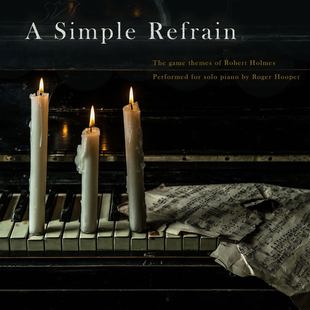
It was definitely a revisiting of that period. I had done some work with Roger on other projects and I love his playing. When I had the idea of doing a piano album of some of my classic themes, he was the first choice to do it. I have loved solo piano albums by people like Wakeman and others, so I thought it would be fun to have a real pianist tackle them. We selected the tunes, then he would do various versions and I would give feedback as the producer until we got to a place that I thought would be very listenable while staying as true to the old arrangements as possible. I still listen to it in my car and find it very soothing, as if it’s someone else’s music I love! LOL. Roger did a fantastic job, and I’m very grateful for his talents on it!
From there, with help from a very successful Kickstarter campaign, you created a brand new collection of game themes “produced in the style of music from Gabriel Knight and Gray Matter games.” What can you tell us about SEQUEL?
Jane and I have been itching to do more games for awhile, and I specifically feel like I have so much more music to get out. When we moved back to the West Coast a few years ago, I was unpacking my studio and I came across some of the old keyboards I had used on the games. I started playing around on them and found I immediately started writing new music that sounded just like it was from a GK game. So I thought, “Gee, I wonder if anyone would like to hear more of that kind of stuff?” I’ve always been amazed at how even now people still love that music, doing cover versions from all over the world, or writing me about what a specific song meant in their life, or even once I was at Disneyland standing in line and a person up the line had the ringtone on their phone go off, and it was the Gabriel Knight theme! That was a surprise!
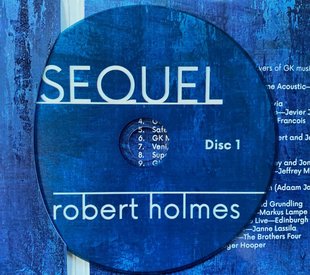
Anyway, it seemed there was some interest from people I asked, so I thought I’d do an album and call it SEQUEL, as if it was a sequel to one of the games. We did the Kickstarter to finance the production, which did really well, and now there are albums and CDs and digital versions all over the world. People have seemed really happy with it, which makes me so happy! So I figured I’d do it again with SON of SEQUEL! J
You composed all the music, of course, but others helped record some of the instruments?
Yes, I played most of the instruments, the pianos, synths, guitars, etc. But we had some great guests adding drums (Troels Pleimert and Jon Paul Sapsford), fretless bass (Marco Machera), and again some great piano and string arrangement additions from Roger Hooper.
And now you’re back on Kickstarter with SON of SEQUEL, which promises more of what we knew and loved from its predecessor, but with at least one key difference this time around.
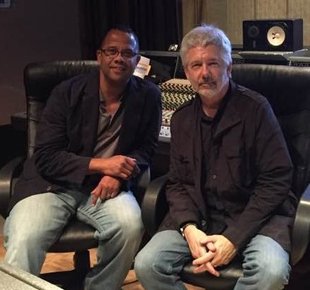
Yes! Actually more than one pivot on this one. First off, my good pal George Napier, who is an amazing ambient synthesis composer and sound designer, has agreed to collaborate and create some sound design interludes to weave between my themes. He will use synths, instruments, and tape-based techniques to create short audio pieces. These interludes will provide the perfect prologues and bridges between themes. With me focusing on the melancholy and hopeful melodies, and George bringing a modern and technically effected flank of treated and manipulated textures and sound, this will be a musical journey through the relationship of our spiritual and technical selves!
Also, I’m very excited to be bringing the folks from The Scarlet Furies in to do a new tune in the musical style of Gray Matter! This will be a real thrill for me, and hopefully for the fans as well!
You and Jane have made no secret about your desire to get back into gaming, even teasing a possible sequel to Gray Matter as a stretch goal for SON of SEQUEL! You certainly have many fans eagerly hoping for the same thing. What needs to happen to bring a new Jensen/Holmes game to fruition? And what are the chances it may even be a new Gabriel Knight adventure one day?
Jane and I have been so pleased to see the amazing support for the album SEQUEL, and how happy people have been to receive more of the music from the world of GK. For us, not only is it a chance to have more of my music out in the world, but it’s a great opportunity for us to reconnect with the fans, refocus the fans of GK and Gray Matter, and add some momentum and awareness that this passionate audience exists and is happy to support this work.
We would love nothing more than to do some more games in these beloved realms, and are doing what we can to help create opportunities for that to happen. With some of the new potential acquisitions of IPs and changes in ownership, we’re hopeful at some point there will be a possibility to see another GK. We would also love to do another Gray Matter, which we own the rights to, so for that it’s more an issue of having it funded. We’re also putting feelers out to hopefully find a place in the content-starved new arenas of places like Netflix, Amazon, Peacock and others to someday perhaps land GK or Gray Matter as a broadcast series, which I think they both would be perfect for, just as the wildly successful The Last of Us was. So we are keeping all doors open, and letting the word go out that we would love to do more!
Well, we certainly wish you all the best, both with getting a new game project off the ground and with your fundraising for SON of SEQUEL. I appreciate you taking the time to answer far more questions than I had any right to ask (believe me, this is the abbreviated version!), but I couldn’t help myself – your life’s just been so darn interesting! Any final words to send us off?
It’s been a pleasure! I’d just like to encourage folks to check out the SON of SEQUEL Kickstarter, and all my other albums on Bandcamp or my website or a digital resource near you, and get connected or involved! 😊 Jane and I send our very best to everyone and thank you all again for your support and interest in our work!


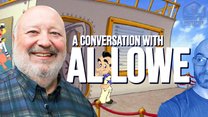

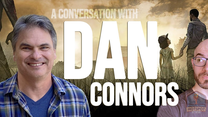
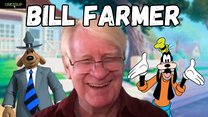
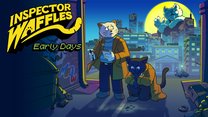
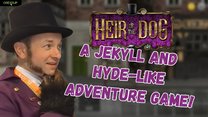
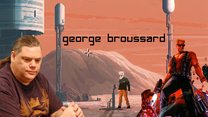
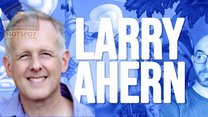
1 Comment
Want to join the discussion? Leave a comment as guest, sign in or register in our forums.
[…] Leave a Comment / News / By Robert Holmes Thanks to Jack, Sean, and Joshua at Adventure Game Hotspot for doing this very fun interview with some unusual and fun topics and links! an independent specialist magazine focused exclusively on adventure gaming. Founded in 2022, An interview with musician/composer Robert Holmes […]
Reply
Leave a comment